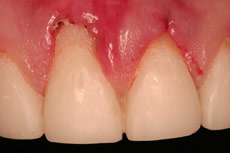What is Periodontal Disease?
Periodontal disease is an inflammatory disease that causes damage to the bone, gum tissue and ligaments around the teeth due to accumulation of oral bacteria on the teeth. Bacteria attach to tooth surfaces around and below the gumline forming plaque or biofilm. If plaque is not removed, it can cause an immune response that is called inflammation. This is presented in the mouth as bleeding, redness and swelling in the gumline. This stage of disease is called gingivitis.
If this inflammation is not resolved it can lead to damages in the supporting structures around the tooth, the gum tissue, ligaments and bone. This stage of disease is called periodontitis. Advanced stages of periodontitis can lead to mobility in teeth, eventual loss of teeth and damage in the bone adjacent to the lost tooth.
Prevention
Removing the plaque and bacteria is the most important preventative measure against periodontal disease. This can be done easily in a healthy individual by daily brushing and flossing. If plaque stays on the teeth long enough it can get hard. This is called calculus or tartar formation.Calculus is not easily removed with tooth brush and floss. A regular cleaning appointment with the dental hygienist can then remove calculus and tartar and control and prevent early stages of periodontal disease. (use this for “gum disease and tooth loss prevention” too.)
Risk Factors
Smoking Tobacco Use
As you probably know, the use of tobacco has been linked to many serious illnesses such as cancer, lung disease and heart disease. What you may not know, however, is that tobacco users have a six times or more greater risk of periodontal disease than non-users.
In fact, studies show that tobacco use may be one of the most significant risk factors in the development and progression of periodontal disease.

How tobacco affects your Oral Health
Whether you smoke, dip or chew tobacco, you have a higher risk of developing periodontal disease — and you will have it more severely — than someone who does not use tobacco products.
As a smoker, you are more likely to have tartar, staining and deeper pockets between your teeth and gums. As a result, your gums may pull away from your teeth, causing deeper pockets and bone destruction. Without the support of bone, teeth may become loose, painful and even fall out.
Research shows that smokers lose more teeth than nonsmokers!
Research also shows that users of tobacco products are more likely to have any or all of the following:
- oral cancer
- bad breath (halitosis)
- stained teeth
- tooth loss
- bone loss
- loss of taste and smell
- gum recession
- mouth sores
- less success with periodontal treatment
- less success with dental implants
Smoking is by far the most significant factor predisposing to implant failure. Heavy smokers have 3 to 4 times the risk of implant failure as non-smokers.
Pregnancy and Puberty
Hormonal changes can cause the gums to become red and tender and bleed more easily. This may worsen any pre-existing periodontal disease. Recent studies suggest Periodontal Disease can lead to pre-term low birth weight. Your periodontist will be able to help prevent gum disease during pregnancy or puberty.
Stress
Stress can make it more difficult for your body to fight infections, including periodontal disease. Recent studies confirm the association between stress and periodontal disease. If you lead a stressful life, see a periodontist.
 Medications
Medications
Some drugs such as oral contraceptives, antidepressants and certain heart medications, can affect oral health. You should always inform your dental care professional of the medicines you are taking and any changes to your health history.
Diabetes
People with uncontrolled diabetes may have more severe periodontal disease. In addition, untreated periodontal disease can make it tougher for uncontrolled diabetics to keep their diabetes under control. If you are a diabetic a periodontist can help keep your gums healthy and possibly help you keep your diabetes under better control.
Systemic disease
Diseases that interfere with the body’s immune system may worsen the condition of the gums. If you suffer from an uncontrolled systemic disease such as osteoporosis, diabetes, immune system deficiency or others, seeing a periodontist can help you avoid gum disease.
Periodontal Disease and Heart Disease: The Link
Risks for heart disease include smoking, high cholesterol, being overweight and having high blood pressure or hypertension. Today, there is evidence mounting that shows periodontal disease may increase your risk for heart disease as well.
Several theories exist to explain the link between periodontal disease and heart disease. One theory is that oral bacteria can affect the heart when they enter the blood circulation, attaching to fat plaques in the arteries of the heart. This may contribute to clot formation. These blood clots can cut off normal flow of nutrients and oxygen required for proper heart function. In turn, this may lead to a heart attack. Researchers have found that people with periodontal disease are twice as likely to suffer from coronary artery disease as those without periodontal disease. Another theory is that chronic inflammation associated with periodontal disease increases various inflammatory mediators in the blood stream that can increase the risk for cardiovascular disorders including heart attacks and strokes. Recent research has also found oral bacteria in brain biopsies of patients with Alzheimer’s disease .
